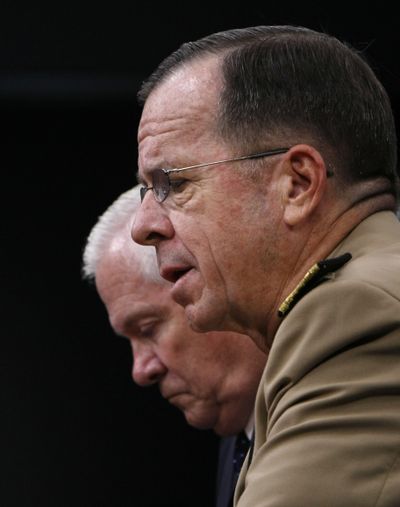Gates open to more troops
U.S. ‘footprint’ in Afghanistan under review

WASHINGTON – Defense Secretary Robert Gates indicated Thursday that he is open to increasing the number of U.S. troops in Afghanistan, voicing a shift in his position as the administration ponders a military assessment expected to lead to a formal request for additional forces.
Gates, in a briefing at the Pentagon, also defended the U.S. mission in Afghanistan, rebutting suggestions that it is time to pull out. His remarks came just hours before the Army announced that it will extend the tours of about 3,000 soldiers in Afghanistan for between two weeks and two months amid an intensifying Taliban insurgency.
Gen. Stanley McChrystal, the top U.S. commander in Afghanistan, submitted a key assessment of the war this week. Gates said the assessment, which President Barack Obama and top military officers are reviewing, had altered his long-standing concern about creating an oversized U.S. “footprint” in Afghanistan.
“I take seriously General McChrystal’s point that the size … of the footprint depends … in significant measure … on the nature of the footprint and the behavior of those troops and their attitudes and their interactions with the Afghans,” Gates said.
“If they interact with the Afghans in a way that gives confidence to the Afghans that we’re their partners and their allies, then the risks that I have been concerned about the footprint becoming too big … is mitigated.” In particular, Gates cited efforts by McChrystal to distribute U.S. troops to better protect the population and reduce civilian casualties.
Gates also rebuffed as “unrealistic” arguments that the administration should narrow the mission to one of counterterrorism in Afghanistan and along the Pakistani border. Instead, he said that uprooting terrorist groups requires a more holistic campaign to shore up internal security – the type of effort McChrystal and other top U.S. military leaders envision.
“Even if you want to focus on counterterrorism, you cannot do that successfully without local law enforcement, without internal security, without intelligence,” he said.
The number of U.S. troops in Afghanistan is already set to roughly double this year, to 68,000, including about 21,000 new troops that Obama ordered to deploy.
In recent months, Gates has warned repeatedly against deploying too many troops, saying the local population would reject them as an occupation force, much as Afghans opposed the 110,000 Soviet forces stationed in Afghanistan in the 1980s.
Now, however, it is widely anticipated that McChrystal will follow up his assessment soon with a request for several thousand more U.S. troops and other resources needed to implement a full-fledged counterinsurgency strategy aimed at bolstering Afghan local governance, as well as at improving the economy and security. The request is expected to focus on troops needed to accelerate and expand the training and mentoring of the Afghan army and police forces so that they can gradually take on security responsibilities.
Officials said Gen. David Petraeus, the head of U.S. Central Command, has endorsed the assessment.
Both Gates and Adm. Michael Mullen, chairman of the Joint Chiefs of Staff, said any troop request for Afghanistan would be weighed against other demands on U.S. forces, including in Iraq.
“We have lots of troops in Iraq, and there are challenges and tension between those two theaters in terms of troop distribution,” Mullen said at the Pentagon news conference.